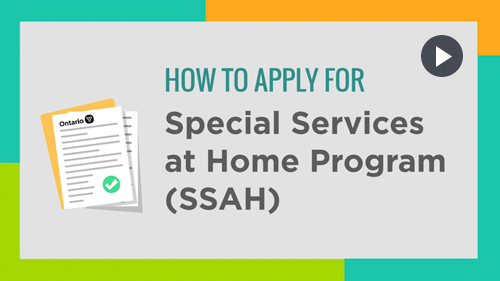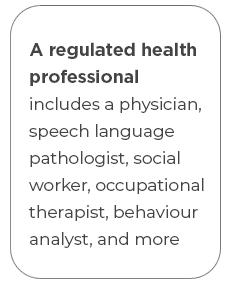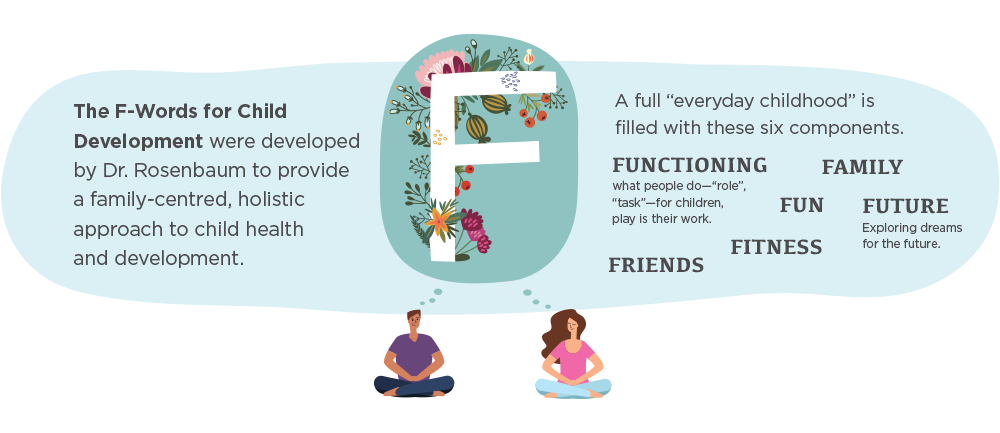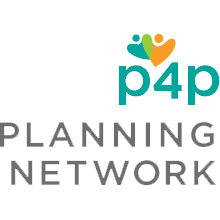
Special Services at Home
Special Services at Home
Special Services at Home (SSAH) is a funding program to support families who are caring for a child with a developmental or physical disabilities to help the child participate in the community and do things that matter to them. SSAH is centred around community involvement and participation and the funding from SSAH offers assistance for children, families, and caregivers with:
- The child’s day-to-day activities
- The child’s growth and development activities; and
- Support for parents and caregivers.
SSAH is a reimbursement program that is funded by the Ministry of Children, Community and Social Services.
SSAH recognizes that families and caregivers know the child best. That is why, with SSAH, the family can choose supports, services and items that are most suitable for the child and their needs.

To be eligible for SSAH, the child must:
- Be a resident of Ontario and entitled to live in Canada
- Be under the age of 18
- Require support beyond what can be provided by the family and beyond what is expected for their age because of a physical or developmental disability to partake in activities in the home and community; and
- Be living at home with their family or be living outside the family home but not receiving additional residential services.

Application Requirements
To complete your application for SSAH you will need:
- Documentation to confirm your child’s need for extra support because of a physical and/or developmental disability. This can be provided by a regulated health professional who can confirm the child’s functional limitations.
- Proof that the child is a resident of Ontario (i.e. school registration document, parent/applicants Ontario driver’s license or utility bill).
- Proof that the child is legally entitled to live in Canada (i.e. Canadian passport, birth certificate, Indian Status, Immigration documents).
For some infants and young children it may be more difficult to receive a diagnosis of a disability while they are young. In this situation, they may still be eligible for SSAH. A regulated health professional can provide a statement describing the child’s growth and development as part of the application. Infants and young children approved in this case will need to redetermine their eligibility around 6 years of age.
Using your funds
SSAH is not an income support program and does not cover the following:
- Basic Living Expenses (ie. food, cell phone, internet, dental care, etc.)
- Services and supports that are already funded or provided through government programs (ie. funding for supports provided by the Assistive Devices Program or the Home and Vehicle Modification Program)
- Activities outside the province of Ontario
SSAH is a reimbursement program. To use your funds, you must submit your receipts and invoices electronically through My Direct Plan, or through your regional office by email or mail.
Eligible expenses covered by SSAH are activities/supports/services that provide:
- Support for the child to participate in day-to-day activities
- This includes
- Support to help the child with their daily routines
- Support with the child’s sensory needs
- Activities relating to the child’s self-care
- Tutoring to support the child’s educational and learning process
- This includes
- Respite services and supports
- This includes hiring someone to help with the child’s care. For example camp, overnight respite, before and after school care and other services and supports that can provide a break for the child and the caregiver or can provide the caregiver with more time to take care of the child.
- Support for the child to participate in activities of growth and development.
- This includes activities that relate directly to the CanChild F-Words for Child Development:
- Functioning: Activities that help the child build a skill. For example, tutoring, swimming or cooking classes.
- Family: Activities that help the child participate in a family activity. For example, admission for the child to attend a family trip to a museum or other activity as long as it is in Ontario.
- Friends: Activities that help the child participate in a social activity. For example, fees for a summer camp or another social activity.
- Fun: Activities that the child would enjoy. For example, hobbies that the child would enjoy like art supplies or scootering equipment.
- Fitness: A physical activity. For example, sports equipment or fees for a recreational sport.
- Future: Activities that would help the child plan for the future (ie. independent facilitation).
- This includes activities that relate directly to the CanChild F-Words for Child Development:

Using the F-Words for your Claims
A crucial aspect of SSAH is the idea that families can determine how the funding supports them and the child. To help support this, SSAH has included the F-Words for Child Development as a key feature of the SSAH framework.
The F-Words were introduced by CanChild and offer a more holistic approach to child health and development. They can help you think about all aspects of your child’s life to create an every-day life that is rooted in community and the things that they want to do.
The F-Words allows for a lot of flexibility for SSAH funding. When submitting your claims as an activity that supports the child’s growth and development it is important to think about the F-words and how the activities are influenced by the F-words. For example, an activity like summer camp fees can classify as an expense that fits the Friends or Fun section.
There are many possibilities for SSAH funding. With SSAH, you are able to use the funding to help your child to experience an everyday childhood.
If you have any questions about your SSAH claim, please contact your regional office for support and any enquiries.
You can submit your Special Services at Home (SSAH) expense claims using the Ministry Expense Form or through MyDirectPlan. We’ve created step-by-step video guides to walk you through each process and help you submit your claims with confidence.
Ministry Expense Form
Watch the video below for instructions on how you can submit SSAH expense claims for reimbursement using the Ministry Expense Form, available on the SSAH website.

MyDirectPlan
Watch the video below for a step-by-step guide on how you can submit your SSAH claims for reimbursement using MyDirectPlan, available both as a website and a mobile app on Google Play and the Apple App Store.



